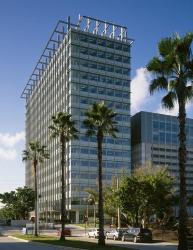Dec 3 2009
The Clinical Research Building (CRB), at the University of Miami Miller School of Medicine, has been honored for its sustainability components. The building was awarded the LEED® designation, established by the U.S.
 The University of Miami Clinical Research Building on the medical campus achieved LEED certification specifically for its energy use, water and material use, as well as incorporating a variety of other sustainable strategies
The University of Miami Clinical Research Building on the medical campus achieved LEED certification specifically for its energy use, water and material use, as well as incorporating a variety of other sustainable strategies
Green Building Council and verified by the Green Building Certification Institute (GBCI). LEED is the nation's preeminent program for the design, construction and operation of green buildings.
"Having a LEED certified building means we're doing our part as a University to be environmentally and socially responsible," says Juan C. Endara, project manager of UM Facilities, Design and Construction. "The LEED certification of the building recognizes those efforts."
The Clinical Research Building on the medical campus achieved LEED certification specifically for its energy use, water and material use, as well as incorporating a variety of other sustainable strategies. By using less energy and water, LEED certified buildings save money for families, businesses and taxpayers; reduce greenhouse gas emissions; and contribute to a healthier environment for residents, workers and the larger community.
"The building meets a high level of performance standards, provides a healthier work environment for the employees and occupants, and costs less to operate and maintain than a non-certified building," Endara says.
LEED Certification of the UM CRB was based on a number of green design and construction features that positively impact the project itself and the broader community. These features include:
- Use of drought tolerant native shrubs and planting materials resulting in 53 percent reduction of irrigating water consumption.
- Use of plumbing fixtures that reduce the use of potable water consumption by 30 percent
- Providing 78 percent of the building's electricity with renewable sources (green power)
- Use of carpet tiles made with recycled materials and use of adhesives with low emitting gases content
- An HVAC (heating, ventilating and air conditioning system) designed to conserve energy
- Implementation of a Green-Cleaning Housekeeping Program
The main purpose of the CRB is to support the continued growth of the UM Miller School of Medicine's clinical research programs and to consolidate current clinical research programs into a single facility. The 15 story, 336,000 square-foot building sits adjacent to SR 836 and I-95, at 1120 NW 14th Street. Its design and construction is consistent with the University of Miami's Green U initiative to become more sustainable through the procurement of environmentally responsible products and environmentally sound maintenance and operations procedures for existing and new buildings.
Source: http://www.miami.edu/